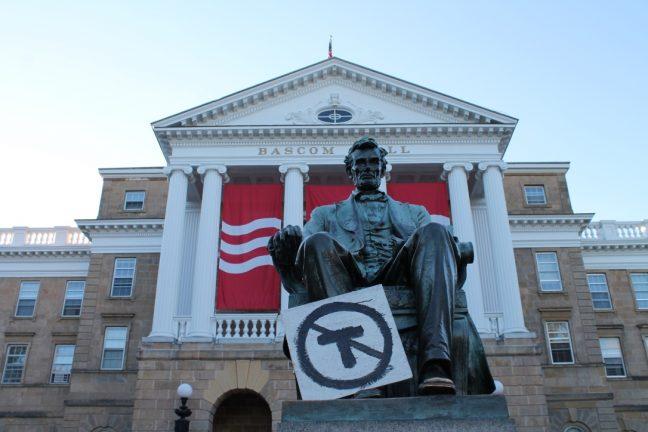When Donald Trump became president-elect, it immediately shocked all those watching on election night. Now there seems to be rage in many cities across the United States. There have been protests here in Madison and in Milwaukee. Rioters in Portland, Oregon threw projectiles at police officers trying to keep order. A man in Chicago was beaten for supporting Trump. A Texas woman kicked her son out for voting for the Republican nominee in a school mock election.
Trump, Johnson sweep Wisconsin in historic night for Republicans
Across America millions seem to be terrified that Trump is going to be a fascist dictator. There are fears of a crackdown on gay rights and abortion. Liberals view Trump’s victory as the rise of white supremacy in the United States as if we are returning to an era before the civil rights movement. There have even been calls for the abolition of the Electoral College.
Across college campuses, students have compared Trump’s victory to the Holocaust. At Barnard College in New York City, safe spaces will be provided where traumatized students can receive hot cocoa and coloring books. To many liberals, the end of times has come. More logically, some have simply realized, as famously stated by a Rolling Stones song played at Trump’s rallies: “You can’t always get what you want.”
No one offered me help when President Barack Obama won in 2008 and 2012, but then again I wouldn’t have needed it. Elections are beautiful in that Americans are given their right to decide their future. No politician dominates the White House. We enjoy a peaceful transition between a president and a winning candidate who have two different ideologies. Other countries don’t have such luxury.
Yet as I watch the rage across America it looks like many people don’t give a damn about the peaceful changing of power when they don’t like the outcome. It is also worth wondering what the protesters think of American institutions. In the case of the Portland riot, it was found that 69 of 112 rioters were not registered to vote in Oregon or didn’t turn in a ballot.
Concerns that Trump’s victory was a “whitelash” (as infamously stated by former Obama administration official and CNN contributor Van Jones) isn’t supported by data. Trump didn’t win the election because of racism. His victory came from a surge in support among blue-collar workers, many of whom voted for Obama twice. Trump won so many of these voters because Democratic nominee Hillary Clinton branded them as racists and sexists rather than listen to their real concerns.
Trump did have his number of controversies, which is why I opposed him in the Wisconsin primary and wasn’t too enthusiastic about his chances of winning. But even though he’s a terrible communicator, especially one who has never been involved in politics, that doesn’t automatically translate to terrible policy.
Trump has never said he would repeal the Civil Rights Act of 1964. If anything, he is going to try to help impoverished African-American communities with his “New Deal for Black America.” Though some of these promises are vague (as are many in his policy papers), he seems to have good intentions.
Trump doesn’t want to roll back previous Supreme Court decisions on abortion and gay marriage. I don’t even think he gives much thought to social topics.
Supreme Court rulings rarely overrule precedents anyway, so Roe v. Wade and United States v. Windsor are most likely safe. Appointing one new justice will not dramatically alter the ideological lean of the current Supreme Court. If anything, it will remain the same if Trump picks someone as conservative as Antonin Scalia. Either way, Trump proudly waved an LGBT pride flag at one of his rallies.
The Electoral College isn’t going no matter what complaints are levied. This is because every politician understands that it successfully served its purpose in this election. The founding fathers of this great nation didn’t want a “tyranny of the majority” and created a system that would balance very large states and very small ones. Such a voting system forces candidates to compromise on certain topics as they have to appeal to different states with different voters who care about different issues.
The Electoral College system makes Wisconsin, and states like ours, important, and that led Trump to campaign intensely in the state. The same is true for smaller swing states like New Hampshire, Iowa and Nevada.
Both Trump and Clinton would have spent more time in larger states like California, Texas and New York in a system based off the popular voter. Messy recounts in close elections wouldn’t just focus on one or two states, but could scatter across the entire nation. It would be a legal nightmare and leave America in catastrophic deadlock.
As Trump approaches his inauguration and organizes his government officials, we must give him a chance. All the doom and gloom is way too premature and focuses on topics where Trump doesn’t take a decisive stance.
Rather than protest a legitimate election and threaten the foundation of the United States, we should welcome the new president with a clean slate.
I plan to revisit this column in a year. If the Supreme Court has overturned past precedents and Trump repeals civil rights, then everyone had good reason to be worried. If not, then we can laugh and their inanity.
John M. Graber ([email protected]) is a junior majoring in history and political science.














